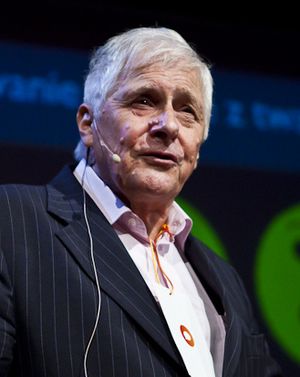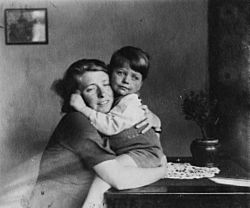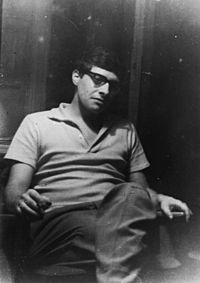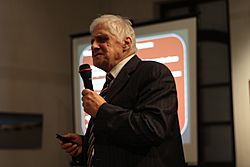Jerzy Vetulani facts for kids
Quick facts for kids
Jerzy Vetulani
|
|
|---|---|

Vetulani at the TEDx Kraków conference, 2011
|
|
| Born |
Jerzy Adam Vetulani
21 January 1936 |
| Died | 6 April 2017 (aged 81) Kraków, Poland
|
| Resting place | Rakowicki Cemetery |
| Citizenship | Polish |
| Alma mater | Jagiellonian University |
| Occupation | neuroscientist, pharmacologist, biochemist |
| Employer | Institute of Pharmacology of the Polish Academy of Sciences |
| Spouse(s) | Maria née Pająk (m. 1963–2017, his death) |
| Children | Marek Tomasz |
| Parent(s) | Adam Vetulani Irena Latinik |
Jerzy Adam Gracjan Vetulani (born January 21, 1936 – died April 6, 2017) was a famous Polish scientist. He was a neuroscientist, which means he studied the brain and nervous system. He was also a pharmacologist, studying how medicines affect the body, and a biochemist, who studies the chemistry of living things.
Professor Vetulani was a member of important scientific groups like the Polish Academy of Sciences. He was one of the most often quoted Polish scientists in the field of biomedicine after 1965.
He worked at the Institute of Pharmacology of the Polish Academy of Sciences in Kraków. There, he was a professor and led the Department of Biochemistry for many years. He published over 240 research papers. He became known for his idea in 1975 about how antidepressant drugs work. He also researched memory and brain diseases.
Jerzy Vetulani was very good at explaining science to everyone. He was the editor-in-chief of a popular science magazine called Wszechświat. He gave many popular talks that people loved. From 2010, he had a blog and social media pages. He also wrote several popular science books that became very popular.
During the time of the Polish People's Republic, he was part of the group that wanted more democracy. He joined the Solidarity movement in 1980. In 2002, he tried to become the mayor of Kraków. He was also involved in many cultural and social projects throughout his life. He was an atheist.
He received many awards and honors, including the Knight's Cross of Polonia Restituta. He was also given honorary doctorates from two medical universities.
Life Story
Early Years and Growing Up (1936–1952)
Jerzy Vetulani was born in Kraków, Poland, on January 21, 1936. His father, Adam Vetulani, was a professor at the Jagiellonian University. His mother, Irena Latinik, was a biologist. Her father was a Polish Army general. Jerzy had a younger brother named Jan, born in 1938.
When Nazi Germany invaded Poland in 1939, Jerzy's father went to fight. He ended up in Switzerland for the rest of the war. Jerzy, his mother, and brother had to leave their home. They were supported by his uncle, Tadeusz Vetulani. His mother worked as a translator to help the family.
Jerzy's mother taught her sons to be proud of their country. They would sing patriotic songs. Jerzy was a religious boy and even served as an altar boy at St. Mary's Basilica.
He remembered the war years as interesting, full of exploring. He and his brother collected insects, especially butterflies. His mother kept them safe from the dangers of the war.
Jerzy started school in 1942 in secret classes. He could already read and write. He later went to high school in Kraków and finished with excellent grades in 1952.
As a teenager, Jerzy stopped being religious. He saw himself as a "rebel." At age twelve, he joined the Union of Polish Youth. He was removed because of a funny typo in a school newspaper. He also joined an Atheists and Freethought Club. He was part of a group of young communists who wanted to improve the Polish communist system.
University and Early Career (1952–1973)
In 1952, Jerzy began studying biology at the Jagiellonian University. He finished in 1957. In 1956, he started working as a volunteer at the Institute of Pharmacology of the Polish Academy of Sciences. He worked there for the rest of his life.
He also studied chemistry at the Jagiellonian University and graduated in 1963. He spent seven weeks in Swansea, Wales, as a student. He worked and learned English by reading the Daily Mirror newspaper every day.
Jerzy was one of the people who helped start the famous Piwnica pod Baranami cabaret. He even filled in as a host when the main host was away. It was there that he met his future wife, Maria Pająk. They married on July 8, 1963. Their sons, Marek and Tomasz, were born in 1964 and 1965. They later had four grandchildren.
From 1955 to 1962, he was a speaker at a film club. He said this helped him learn to speak clearly and quickly. In 1972, he was a science advisor for a film called Illumination.
After his brother died in 1965, Jerzy focused on his Ph.D. He earned his Ph.D. in natural sciences in 1966. That same year, he went to Great Britain for a scholarship. He worked at the University of Cambridge, learning new methods for research. When he returned to Poland, he started working in psychopharmacology, which studies how drugs affect the mind.
World Science and Opposition (1973–1989)
After getting his next degree, he went to the United States for almost two years. From 1973 to 1975, he worked at Vanderbilt University. He became famous around the world in 1975. He and Fridolin Sulser discovered how some antidepressant medicines work. Their research was published in the science magazine Nature and became very important.
After his mother passed away, he and his family returned to Poland. He became an associate professor in 1983 and a full professor in 1989. In 1976, he became the head of the Department of Biochemistry at the Institute of Pharmacology.
In the 1970s, he translated short stories for a magazine. He also wrote articles about his time in the United States. He often visited Rome for his research work. He even met John Paul II, who had been a student of his father.
In 1983, Vetulani received the International Anna-Monika Prize for his research on how electroconvulsive therapy works. From 1981 to 2002, he was the editor-in-chief of Wszechświat, a very old Polish popular science magazine.
He was also active in the Solidarity movement starting in 1980. This was a big movement that helped bring democracy to Poland. He used his position as a magazine editor to help the movement. During a time when the government had strict rules, he secretly carried a letter from Solidarity to the Pope in Vatican City.
Later Career and Public Life (1989–2006)
After Poland became democratic in 1989, Vetulani continued to be involved in public life. He was a member of the Solidarity Citizens' Committee.
He was a member of important international science groups. From 1999 to 2001, he was the President of the Polish Neuroscience Society. He also helped create a Polish term for brain structures called neurofibrillary tangles.
In 1991, he became a member of the Polish Academy of Learning. He often hosted and led discussions at the Scientific Cafe there. He was also involved in art and cultural groups in Kraków. In 2002, he tried to become the mayor of Kraków but was not successful.
In 2008, he became a member of the Polish Academy of Sciences. He held many important roles within the academy over the years.
Sharing Science with Everyone (2006–2017)
In 2006, Professor Vetulani stepped down from his role as head of the biochemistry department. He then spent much of his time sharing science with the public. He had already started doing this in the 1960s by writing short articles. After 2000, he became famous for his talks about the human brain. He spoke about how neuroscience connects to different parts of life and culture. He gave lectures every year at the Cracow Brain Week.
In June 2010, Vetulani started a blog called Piękno neurobiologii (The Beauty of Neuroscience). He wrote about new discoveries in brain science and interesting facts about the brain. He also shared his thoughts on cultural and social topics. He said he wanted to share his knowledge with others. He chose blogging because it let him reach many readers and write freely. From December 2011, he also had a YouTube channel where he shared videos of his lectures. He gave many interviews and appeared on radio and TV, becoming a science celebrity.
After 1989, Vetulani supported political parties that were in the center or on the left. He publicly supported different candidates in elections.
In the 2000s, he taught at several colleges in Kraków. He lectured on topics like cosmetology and dietetics from a brain science point of view. He also taught at the Jagiellonian University Medical College.
In 2010, he appeared in a fun video made by the Jagiellonian University community. He played the grandfather of the main character. From 2010, Vetulani also performed regularly in a live show called Gadający Pies (The Talking Dog). He became one of the main attractions of the show. He compared the feeling of The Talking Dog to the early days of the Piwnica pod Baranami cabaret. He also performed in a short film and a music show.
Since 2014, he supported charity auctions. He donated signed books and offered meetings for coffee or dinner to raise money. In 2015 and 2017, he was part of the Honorary Committee for the Parada Równości (Equality Parade) in Warsaw. He strongly disagreed with some government reforms in Poland. He joined protests against the government taking over public media in 2016. He also protested in Kraków in 2017. In November 2016, an exhibition of photos from his 80th birthday party was opened.
Accident and Passing Away
On March 2, 2017, Jerzy Vetulani, at 81 years old, was hit by a car while crossing the street. He was walking home from work. He was seriously injured and put into a special medical coma. His health did not get better, and he passed away in the hospital on April 6, 2017.
He was buried on April 18, 2017, in the Rakowicki Cemetery in Kraków. His funeral was a non-religious ceremony. Many important people, including the Mayor of Kraków, spoke at his funeral. His wife, Maria Vetulani, passed away a few months later.
His Ideas
Vetulani said that the book The Naked Ape by Desmond Morris greatly shaped his way of thinking. He read it in 1967 and said it helped him see humans like any other animal species. He realized that humans are unique but also funny in their own way. He believed that happiness comes from passing on one's genes to future generations. He often quoted Theodosius Dobzhansky: Nothing in Biology Makes Sense Except in the Light of Evolution.
He liked the philosophy of utilitarianism by John Stuart Mill. This idea says that what is moral is what makes the most people happy. He loved fantasy and science fiction books, especially by authors like Ursula K. Le Guin, Isaac Asimov, J. R. R. Tolkien, and George R. R. Martin. His favorite saying came from Asimov's Foundation: "May your moral sense never lead you to make a wrong decision."
Selected Works
Research Papers
- Vetulani J, Sulser F (1975). Action of various antidepressant treatments reduces reactivity of noradrenergic cyclic AMP-generating system in limbic forebrain. Nature, 257(5526), 495–496.
- Nalepa I, Vetulani J (1991). Involvement of Protein Kinase C in the Mechanism of in Vitro Effects of Imipramine on Generation of Second Messengers by Noradrenaline in Cerebral Cortical Slices of the Rat Neuroscience. Neuroscience, 44(3), 585–590.
- Vetulani J, Antkiewicz-Michaluk L, Nalepa I, Sansone M (2003). A Possible Physiological Role for Cerebral Tetrahydroisoquinolines. Neurotoxicity Research, 5(1), 147–155.
- Antkiewicz-Michaluk L, Lazarewicz JW, Patsenka A, Kajta M, Zieminska E, Salinska E, Wasik A, Golembiowska K, Vetulani J (2006). The Mechanism of 1,2,3,4-Tetrahydroisoquinolines Neuroprotection: the Importance of Free Radicals Scavenging Properties and Inhibition of Glutamate-Induced Excitotoxicity. Journal of Neurochemistry, 97(3), 846–856.
Popular Science Books
- 1985: Dzień dzisiejszy i jutro neurobiologii (Today and Tomorrow of Neurobiology)
- 1993: Jak usprawnić pamięć (How to Improve Memory)
- This book was reissued twice. A journalist called it a "page-turner."
- 2010: Mózg: fascynacje, problemy, tajemnice (Brain: Fascinations, Problems, Mysteries) – Won Kraków Book of the Month Award.
- 2011: Piękno neurobiologii (The Beauty of Neuroscience)
- This book continued the themes of his previous book and included interviews.
- 2015: Bez ograniczeń. Jak rządzi nami mózg (No Limits. How the Brain Rules Us) (with Maria Mazurek)
- 2016: A w konopiach strach (And Fear in Hemp) (with Maria Mazurek)
- 2017: Sen Alicji, czyli jak działa mózg (Alice's Dream, or How the Brain Works) (with Maria Mazurek, published after his death)
- This book for children won the "Wise Book of the Year" award. It sold over 40,000 copies and was translated into other languages.
Interviews
- 2015: Mózg i błazen (Brain and Clown) (interviewed by Marcin Rotkiewicz)
- 2017: Ćwiczenia duszy, rozciąganie mózgu (Soul Exercises, Brain Stretching) (in conversation with a priest, Grzegorz Strzelczyk)
Awards and Honors
- Awards from the Polish Academy of Sciences (1972, 1977, 1982, 1986, 1992)
- Gold Badge of the Copernicus Polish Society of Naturalists (1986)
- International Anna-Monika Prize (1983)
- Honorary member of the Indian Academy of Neurosciences (1988)
- Gold Cross of Merit (1990)
- Nicolaus Copernicus Scientific Award (1996)
- Jerzy Konorski Award (2001)
- Award from the Prime Minister of Poland for his scientific achievements (2003)
- Knight's Cross of Polonia Restituta (2004)
- Honorary degree from the Medical University of Silesia (2004)
- Jędrzej Śniadecki Medal for his research in psychopharmacology (2006)
- Honorary member of Polish Neuroscience Society (2007)
- Honorary degree from the Medical University of Łódź (2008)
- Honoris Gratia badge from the mayor of Kraków (2009)
- Kraków Book of the Month (January 2011)
- Rationalist of the Year from Polish Rationalists Society (2012)
- Special Award for "Science Popularizer" for all his popular work (2012)
- Gazeta Krakowska Man of the Year (2014)
- Medal for Long Marital Life (2014)
- Starost of Gorlice Award (2016)
- Honorary Fellow of the Oxford Neurological Society (2017)
 | Jewel Prestage |
 | Ella Baker |
 | Fannie Lou Hamer |




